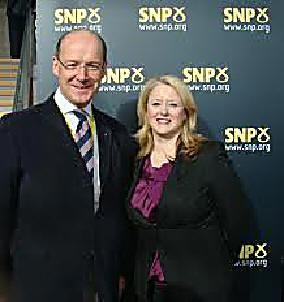|
Independence Rally
It’s
been a fantastic week! The Yes clans came together in no uncertain
terms. Some 30,000 people, in fact, from many different countries and
right across this one, to join in support for Scottish Independence. We
know there were 30,000 because we counted them all in!
They
marched for an hour from just below our iconic Edinburgh Castle, over
the bridge and up onto Calton Hill from where we could look over the
entire, beautiful capital.
Here’s
a picture of what Calton Hill looks like on a lovely sunset Edinburgh
evening:

And
here’s just a couple of rally pictures to show Calton Hill to you in,
well, a rather different light! The atmosphere was truly Electric
Scotland…
You
can see lots more pictures here:
http://tinyurl.com/qh4s742

The crowds gathering
along the North Bridge on the way to Calton Hill

He doesn’t really need
any introduction….
It was
an amazing day with a tangible Yes buzz in the crowd and among the
speakers. Our first Scottish Asian speaker, Tasmina Ahmed-Sheikh (www.tasmina.eu
), who’s standing for Europe next May, really gave it her all. It seems
as if addressing 30,000 people just comes naturally to some!

Tasmina Ahmed-Sheikh speaks to 30,000 Yes supporters
At
the Scottish Parliament
Inside
the Parliament, we’ve had a string of important debates. One in
particular that is of special interest to me was about the secretive and
disgusting practice of Blacklisting.
This
is where companies, most commonly either in the oil and gas or
construction sectors, blacklist individuals, thus making sure they can’t
get work. Why do they do it? Because it’s all so secretive, we can
really only speculate about the reasons. Individual victims will soon
guess what’s happened when they find themselves repeatedly turned down
for contract work.
They
might go to their Union but they too are constrained in the fight. No
company guilty of Blacklisting is going to own up and say ‘oh sorry,
we’ll stop that now.’
Anecdotally, I’ve heard some reasons given: there’s been some kind of
row between two workers, or there’s a woman involved somewhere. Someone
took too much sick leave or turned up late twice. It may have nothing to
do with work at all but with some kind of row about something else
entirely – which football team you support perhaps - or just a means of
getting back at someone you don’t like.
Whatever the alleged ‘crime,’ there is certainly no judge and no jury;
just a guilty in absence verdict.
The
Scottish Government has been fighting Blacklisting for years,
pressurising the private sector to outlaw it and seeking to make sure
that firms with a history cannot get the kind of lucrative public sector
projects they would like.
So it
was good to see the First Minister signing off the Procurement Reform
Bill over to the Parliament. The Bill sets down some very important
enhancements, one of which refers to eliminating Blacklisting.
We
have been working alongside the Scottish Trades Union Congress (www.stuc.org.uk)
since April to find an effective way of ending this abhorrent practice.
The new powers will mean that regulations will be made so that if a
company is found guilty of Blacklisting it will not be able to qualify
for public sector contractual obligations unless it is able to
demonstrate that it has mended its ways in terms of how matters are
taken forward.
The
Scottish Government Budget
We
also had the Budget for 2014-15. You can see the speech here from the UK
but you’ll need VPN from the States:
http://www.bbc.co.uk/news/uk-scotland-scotland-politics-24045319
The
key points are:
· Westminster has cut Scotland’s budget by 11% in real terms for
the next five years and capital spending by over 26%
· Additional 125 fully funded hours of early learning and
childcare to be delivered.
· Drive investment in affordable housing of over £1.35 billion
over 4 years.
· Provide £24 million for a National Performance Centre for
Sport.
· Secure £8 billion of infrastructure investment over the next 2
years.
· Invest £522 million in colleges next year rising to £526
million in 2015-16.
· Provide at least £68 million in each of the next two years to
mitigate the impact of UK welfare cuts and a further £20 million this
financial year to limit the impact of the bedroom tax.
· £33 million per year for the Scottish Welfare Fund.
· Maintain a Council Tax freeze across Scotland.
· Maintain the Council Tax reduction scheme.
· Continue social way commitments, free prescriptions,
concessionary travel and free personal care.
· Protect the NHS budget.
· Protect the Local Government budget.
· Maintain a Scottish Living Wage for public sector workers.
· Reject UK plans to reform pay progression.
· Provide £120 million funding in 2015-16 to assist health and
social care integration.
Please
forgive me for that long list but it just shows what a smart Cabinet
Secretary like John Swinney (http://tinyurl.com/omlyyg3
}can manage to achieve even within the reduced money
we’re getting back from Westminster. There are still people, especially
in England, who labour under the delusion that Scotland gets more money
out of London’s Treasury than it puts in.
Another myth from the No campaign. In fact, we put over £1,000 per
Scottish family into the London Treasury than we get back out from it.
Add in oil and gas revenues, which of course London gets, not Scotland,
and that equates to around £1,500.
All of
which underlines just how crucial it is that we get our own levers of
power on 18 September 2014. Then John Swinney can reveal even more of
what he’s so good at even in these restrained times.

Christina with Cabinet
Secretary for Finance, John Swinney MSP
Justice and Corroboration
There’s an important Scottish Criminal Justice Bill gradually working
its way through the Committee stages just now. It recommends some pretty
fundamental changes made partly on the basis of a Review commissioned
from Lord Carloway, an eminent Judge. You can see it here:
http://tinyurl.com/nfskqy7
One of the things Lord
Carloway recommends very strongly is that the Scottish judicial system
changes the law on corroboration. He argues that it disadvantages, even
discriminates, particularly against women who are victims of domestic
and sexual abuse.
Corroboration is clearly virtually impossible for a woman who is
brutally attacked in her home by her partner. She may be raped,
battered, humiliated – but how does she prove it when she has to have
two independent witnesses to uphold her complaint?
Violent and abusive partners do not normally carry out their crimes in
view of others, with the possible exception of their children who may be
very young and who will in any event be unable to provide disinterested
evidence to a court.
Organisations such as Scottish Women’s Aid and Rape Crisis Scotland
(among others) support this position, as do I, and I spoke in a Tory
debate seeking to abandon this change on Wednesday. You can see the full
debate here:
http://tinyurl.com/6og2ar3
Some people fear that if
you remove the essential requirement for two witnesses, you are somehow
risking more miscarriages of justice but research tell us that is not at
all the case.
Since
I’m co-convenor of the cross-party Committee on Men’s Violence Against
Women, (http://tinyurl.com/nlasx7v
) I’ve seen more than enough tragic evidence to
persuade me that women need more support to ensure that the men who
abuse them face proper court proceedings. There is a host of safeguards
already in place to make sure we don’t get caught up in vexatious cases
and we may even add more.
The
idea that we could withhold justice from someone because there is no
witness to an alleged crime carried out in private is simply wrong. Most
other countries don’t have this requirement. In fact, Lord Carloway
couldn’t find a single comparable country carrying that restraint. |

